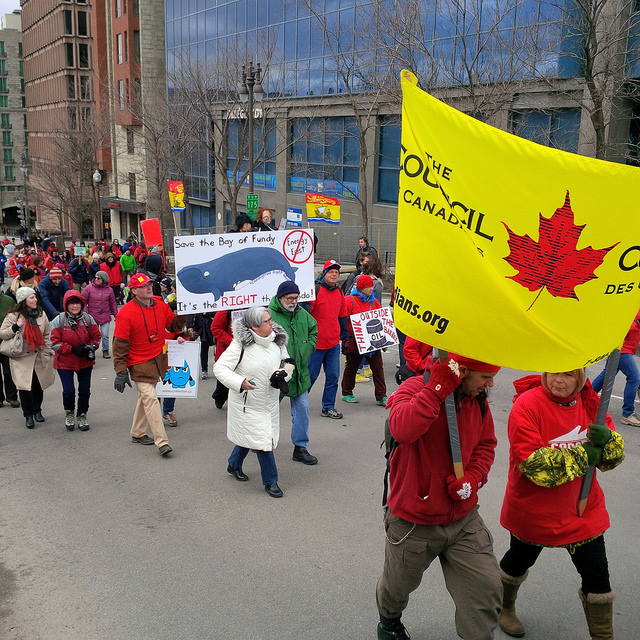This past Saturday (April 11), the Council of Canadians joined 25,000 people in Quebec City and at solidarity rallies across the country to demand climate action from provincial and territorial governments.
Quebec premier Philippe Couillard invited his counterparts to attend a summit on climate change in that city to “pave our way to the Paris conference of 2015 with concrete commitments.” Most premiers attended the summit on Tuesday (April 14) except for Alberta premier Jim Prentice, Nova Scotia premier Stephen McNeil and Prince Edward Island premier Wade MacLauchlan. British Columbia premier Christy Clark participated in part of the meeting via telephone.
Public opinion was onside for the premiers to take action.
A poll released last week found that 61 per cent of Canadians believe protecting the climate is more important than building the Energy East pipeline and further developing the tar sands, while 58 per cent want a commitment to phase out coal, oil and gas and replace it with renewable energy.
This week, a Think Progress article quoted Council of Canadians organizer Mark Calzavara commenting, “Everybody’s sort of waiting with bated breath to hear what announcements come out of it. It’s really the only hope that the environmental movement has in Canada as far as government action on climate change.”
Unfortunately, the Canadian Press now reports, “The premiers did not agree to any specific goals in their joint declaration — only to ‘adopt’ and ‘promote’ ways to reduce greenhouse gas emissions and ‘advance’ new technologies. The final declaration also represented how divided the provinces are on the issue of how to fight climate change. A draft document included a reference to the ministers agreeing to ‘put a price on carbon or adopt other structuring initiatives’ to help reduce greenhouse gasses. The final declaration only stated that premiers agreed to ‘make a transition to a lower-carbon economy through appropriate initiatives.'”
That news report also notes, “Provinces including Quebec and Ontario want to cap and trade carbon emissions and have set hard targets to reduce greenhouse gas emissions. Others such as Manitoba, Prince Edward Island and Alberta have less clearly defined targets to reduce carbon emission.”
Public opinion and those who mobilized on the weekend were calling on provincial and territorial governments to say “yes to climate protection, no to expanding Canada’s tar sands and pipelines, and yes to just, green, renewable energy.” Council of Canadians chairperson Maude Barlow has stated, “Premiers need to get on the right side of history, reject extreme energy projects and help pave the way to more equitable, sustainable ways of being.”
These leaders failed in that task and remained on the wrong side of history.
The premiers will be meeting again on July 14-18 in St. John’s, Newfoundland and Labrador to finalize a provincial-territorial energy and climate change strategy. It remains to be seen if they will take the action required of them before the pivotal United Nations climate summit that will take place just months after that from November 30 to December 11 in Paris.




